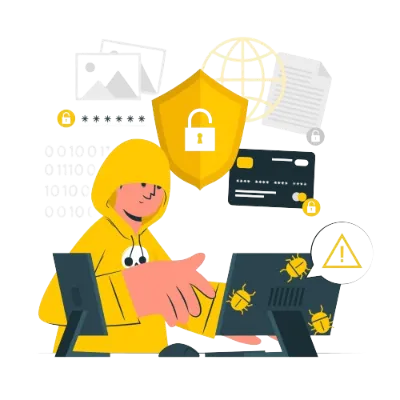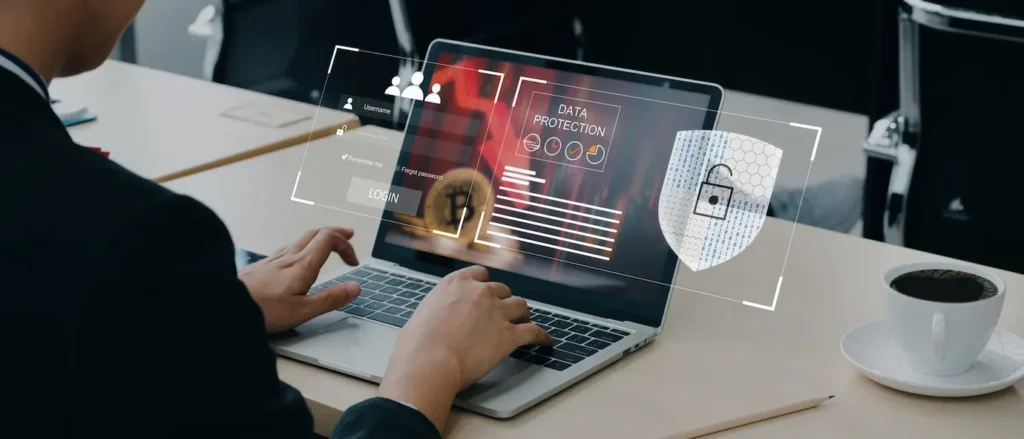Securing Your Digital World! Understanding Cybersecurity for Safeguarding Your Online Data

In today’s increasingly digital world, cybersecurity has become a paramount concern for individuals and organizations alike. As we rely more heavily on technology for personal and professional endeavors, the potential threats to our online data and privacy have also grown exponentially. Cyberattacks, data breaches, and identity theft are just a few of the perils that can befall us in the digital realm.
The Growing Threat Landscape
The sophistication and frequency of cyberattacks have been steadily increasing, driven by evolving technologies, lucrative financial gains, and the ever-expanding digital footprint of individuals and businesses. Hackers and cybercriminals are constantly devising new methods to exploit vulnerabilities, infiltrate systems, and steal sensitive information.
Understanding Cybersecurity
Cybersecurity encompasses a wide range of practices, technologies, and measures designed to protect computer systems, networks, and data from unauthorized access, theft, damage, or disruption. It involves safeguarding sensitive information, preventing cyberattacks, and ensuring the availability and integrity of online systems.
What is Cybersecurity?
Cybersecurity is the practice of protecting computers, devices, networks, and data from unauthorized access, theft, and damage. It encompasses a wide range of activities, including:
- Protecting against cyberattacks such as malware, phishing, and ransomware
- Implementing security measures such as firewalls, encryption, and access controls
- Ensuring the confidentiality, integrity, and availability of data.
Why is Cybersecurity Important?
Cybersecurity is important for both individuals and organizations. For individuals, a cyberattack can result in identity theft, financial loss, and damage to their reputation. For organizations, a cyberattack can result in data breaches, lost productivity, and reputational damage.
Common Cybersecurity Threats
There are a number of common cybersecurity threats that individuals and organizations should be aware of, including:
- Malware: Malware is software designed to harm a computer system, such as viruses, worms, and Trojan horses.
- Phishing: Phishing is a type of social engineering attack that tries to trick users into revealing their personal information, such as their passwords or credit card numbers.
- Ransomware: Ransomware is a type of malware that encrypts a user’s files and demands a ransom payment in exchange for the decryption key.
How to Protect Yourself from Cyberattacks
There are a number of things you can do to protect yourself from cyberattacks, including:
- Use strong passwords and unique passwords for each of your online accounts.
- Enable two-factor authentication (2FA) for your online accounts. 2FA adds an extra layer of security by requiring you to enter a code from your phone in addition to your password.
- Keep your software up to date. Software updates often include security patches that fix vulnerabilities that cybercriminals can exploit.
- Be careful about what you click on. Don’t click on links in emails or messages from unknown senders.
- Be aware of phishing scams. Phishing emails often look like they are from legitimate companies, but they are actually trying to trick you into revealing your personal information.
Common Cybersecurity Threats
Phishing: Phishing attacks involve deceptive emails or websites that attempt to trick users into revealing sensitive information, such as passwords or credit card numbers.
Malware: Malware is malicious software designed to harm or disrupt computer systems. It can include viruses, worms, Trojan horses, and spyware.
Ransomware: Ransomware is a type of malware that encrypts a victim’s files and demands a ransom payment for decryption.
Social Engineering: Social engineering involves manipulating people into divulging confidential information or performing actions that could compromise security.
Protecting Your Digital Life.
Strong Passwords: Create strong, unique passwords for all your online accounts. Avoid using easily guessable information, such as birthdays or pet names, and combine upper and lowercase letters, numbers, and symbols.
Two-Factor Authentication (MFA): Enable MFA whenever possible. This adds an extra layer of security by requiring a second verification step, such as a code sent to your mobile phone in addition to your password.
Software Updates: Regularly update your operating system, applications, and software to patch known vulnerabilities and protect against newly discovered threats.
Beware of Suspicious Emails: Be cautious of unsolicited emails, even if they appear to be from legitimate sources. Check sender addresses, hover over links before clicking, and avoid opening attachments from unknown senders.
Secure Wi-Fi Usage: Avoid using public Wi-Fi networks for sensitive activities, such as online banking or shopping. If you must use public Wi-Fi, consider using a virtual private network (VPN) to encrypt your traffic.
Back-Up Your Data: Regularly back up your important data to an external hard drive or cloud storage service. This ensures you have a copy of your data in case of a cyberattack or system failure.
Seek Professional Help: For businesses, consider engaging cybersecurity professionals to conduct vulnerability assessments, implement robust security measures, and provide ongoing security awareness training for employees.
The Role of Website Designing Companies in Pune
Website designing companies in Pune play a crucial role in ensuring the security of their clients’ websites. They should follow best practices for web development, implement secure coding practices, and utilize reputable e-commerce platforms like Shopify.
E-Commerce Website Design Company in Pune
E-commerce website design companies in Pune should prioritize security measures, such as data encryption, payment gateway integration, and regular vulnerability scans, to protect customer data and financial transactions.
Shopify Ecommerce Development Company
Shopify ecommerce development companies should be well-versed in Shopify’s security features and implement best practices for securing Shopify stores, including strong passwords, two-factor authentication, and regular software updates.
AI Regulation
As artificial intelligence (AI) becomes increasingly prevalent, it is important to establish clear regulations and guidelines to ensure the responsible development and use of AI. This includes addressing issues like data privacy, ethical considerations, and algorithmic bias.
Micro-Influencer Marketing
Micro-influencer marketing, which involves collaborating with social media influencers with smaller but more engaged followings, can be an effective marketing strategy. However, it is important to partner with reputable influencers and avoid those promoting scams or questionable products.
Shopify Website Development Company
When choosing a Shopify website development company, consider their experience, expertise in Shopify security, and ability to provide ongoing maintenance and support.

Conclusion
Cybersecurity is an ongoing process that requires vigilance, proactive measures, and continuous adaptation to evolving threats. By understanding cybersecurity fundamentals, implementing best practices, and seeking professional guidance when needed, we can safeguard our digital lives and protect our valuable data.
People Also Ask
1. What are some easy ways to create strong passwords?
Creating strong passwords can be tricky, but there are a few easy ways to make them more secure:
- Use a passphrase: Instead of a short word, use a longer phrase that is easy to remember for you but difficult to guess for others. For example, instead of “password123,” you could use “ILoveMySecureDigitalLife!”
- Combine different character types: Include uppercase and lowercase letters, numbers, and symbols in your passwords. This makes them much harder to crack.
- Use a password manager: A password manager can help you create and store strong, unique passwords for all of your online accounts.
2. How can I enable two-factor authentication (2FA) for my online accounts?
The process for enabling 2FA will vary depending on the specific online account you are using. However, most websites and apps will have a security settings section where you can enable 2FA. You will typically need to download an authentication app on your smartphone and then link it to your account.
3. What are some of the different types of malware?
There are many different types of malware, but some of the most common include:
- Viruses: Viruses can replicate themselves and spread to other computers. They can damage your files, steal your data, or even render your computer unusable.
- Worms: Worms are similar to viruses, but they can spread without needing to be attached to another program.
- Trojan horses: Trojan horses disguise themselves as legitimate software, but once they are installed on your computer, they can steal your data or damage your system.
- Spyware: Spyware can monitor your activity on your computer and steal your personal information.
4. How can I avoid phishing scams?
There are a few things you can do to avoid phishing scams:
- Be suspicious of unsolicited emails: Phishing emails often look like they are from legitimate companies, but they are actually trying to trick you into revealing your personal information.
- Don’t click on links in emails from unknown senders: If you are unsure about the legitimacy of an email, don’t click on any links or attachments.
- Hover over links before clicking: When you hover your mouse over a link, you can see the actual URL in the bottom left corner of your browser window. Be wary of links that don’t go where they say they are going.
- Go to the website directly: If you receive an email from a company about your account, it is best to go to the company’s website directly (by typing the URL into your browser bar) and log in to your account to check for any messages.
5. What is the difference between a website design company and a website development company?
Website design companies focus on the visual aesthetics of a website, such as the layout, color scheme, and graphics. Website development companies focus on the technical aspects of building a website, such as the coding and functionality. Some companies may offer both design and development services.
- QUICK LINKS
TurnOnWeb Solutions - Zoho's Partner
- OUR ESTEEMED PARTNERS
- QUICK LINKES
- SERVICES



- OUR ESTEEMED PARTNERS

